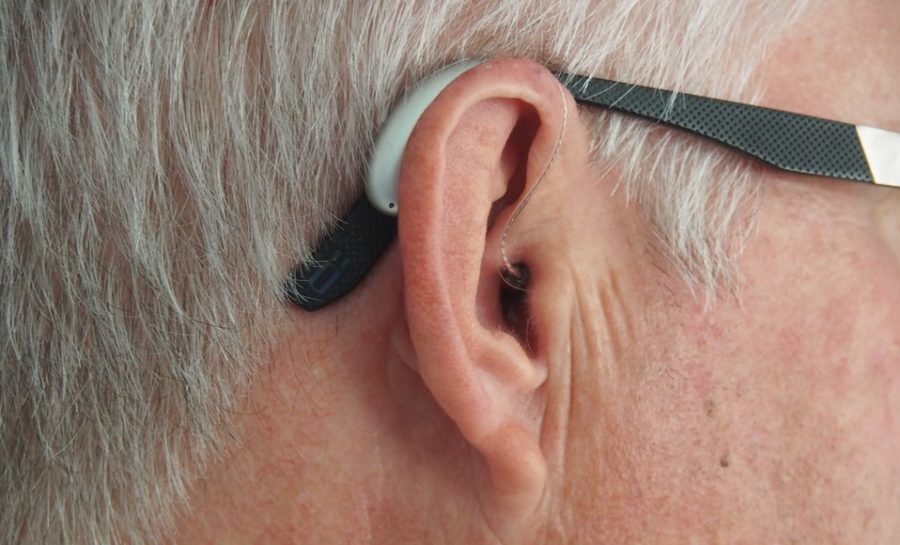Hearing loss may seem like a minimal inconvenience, but it could develop into dementia as people age
New research points to a connection between hearing loss and cognitive decline
The following written content from Dr. Sugata Bhattacharjee
There has been a lot of discussion around dementia in recent years. The primary reason is that, proportionally, there are growing numbers of older people around the
Dementia is an age-related condition, so we can safely assume that this will also increase with the ageing population. There are estimates that the number of people with dementia will increase 100 per cent by 2040 as compared to the levels at the turn of the century.
In addition to the specific individual with dementia, family members and friends often also suffer effects. Dementia care is expensive, so there have been considerable efforts to identify treatments and management strategies to prevent or delay the onset of dementia and to improve the quality of life for people with dementia.
Finally, in recent years, partly because of this increase in elderly individuals, there has been a focus on “healthy ageing.” This includes healthy eating, not smoking, appropriate physical activity, maintaining a healthy weight, avoiding falls, and making mental health a priority.
Dementia is a fairly broad term. There are many different types, and some of the types can co-exist for a given individual. In general, it describes symptoms that can include memory problems, language problems, personality changes or thinking difficulties.
The most common is Alzheimer’s dementia. The cause of dementia can be damage to the brain due to natural ageing, disease (in the case of Alzheimer’s dementia) or vascular issues, often caused by a series of strokes. It is nearly always a progressive degenerative disease, which means that a person with dementia has more and more difficulty with memory, understanding and communication over time.
They are similar and are sometimes used interchangeably, but there are some differences. As explained by Dr Nicolas Reed of Johns Hopkins School of Medicine, cognitive decline represents a change in thinking and memory abilities in one or more cognitive domains, such as processing speech, working memory, expressive language, or complex attention.
On the other hand, dementia is characterised by a major decline in one or more cognitive domains and the cognitive deficits are enough to interfere with independence in daily activities. The criterion of interference with independence is what separates a mild cognitive impairment from dementia. In other words, a person could have cognitive decline without dementia, but if you have dementia, you also will have cognitive decline.
It is rare for someone under the age of 65 to have dementia, but approximately one in 70 people aged 65-69 have this disorder, and nearly one in four people aged 85-89 have dementia. Given the ageing demographic, the number of patients with cognitive concerns will only grow.
We also know that approximately one in three people between the ages of 65 and 75 has hearing loss, and nearly half of those older than 75 have difficulty hearing. When we compared these hearing loss data with the dementia prevalence findings, we saw that for older individuals, there is a relatively high probability of having both dementia and hearing loss.
For this reason, you will see reports mentioning a “link”, an “association”, or in some cases, a “cause,” between hearing loss and dementia. These terms have different meanings and must be used carefully.
It could be that there is a strong association between hearing loss and dementia simply because both happen in older individuals, yet neither one caused the other. If there is causality, this would mean that the hearing loss is directly contributing to the risk of cognitive decline and dementia.
All this has been studied extensively over the past 10 years or more, and today, most research is leading to the conclusion that hearing loss indeed increases the risk for dementia. That is, it is more than just a link or an association.
March 3 of every year is observed as World Hearing Day. The World Health Organisation (WHO) has predicted that one in four people will have some amount of hearing loss by 2050.
Dr Frank Lin of Johns Hopkins School of Medicine, a leading researcher in this area, explains that there may be several factors at play. One of them is what is called cognitive load. When you can’t hear well, the ear is constantly sending a garbled auditory signal to the brain. The brain constantly has to work harder to process that degraded signal. The brain must then reallocate resources to deal with that garbled auditory signal. This comes at the expense of other systems.
Cognitive resource capacity is the belief that there is a pool of cognitive resources for thinking, planning, and memory. We know that over time, with ageing, we can lose some of these resources. The brain is constantly having to reallocate resources to help with deciphering and decoding that much more garbled auditory signal.
In other words, different regions of the brain are being recruited for auditory and language stimuli to compensate for the poor auditory signal, and the brain needs to expend more effort to decode the signal. This is one pathway through which hearing loss could directly impact cognitive decline and dementia.
Maybe, which is a second possible factor. This is the notion that hearing loss in and of itself may lead to changes in terms of brain structure and, as a result, brain function. This finding is based on studies conducted on large groups of older adults with hearing loss over many years using brain MRI scans. In several different studies, it has been found that people with hearing loss have faster rates of brain atrophy. The structural integrity of the brain dictates its function, which is now reduced.
There is considerable research showing that even for older individuals with normal hearing and no dementia, because of subtle changes in neural structure, they will have trouble understanding speech in background noise. Many social activities involve background noise. This, of course, becomes considerably worse when hearing loss is present, and there are negative consequences. The negative consequences tend to have a cumulative effect:
- There is reduced audibility of important high-frequency sounds that are necessary for differentiating different words.
- There is poor brain differentiation of signals – the individual has difficulty separating the speech they want to hear from the speech that they don’t want to hear.
- Poor short-term memory-unable to fill in the blanks of missing words fast enough to keep up with conversations. While the individual is trying to piece together an important word in one sentence, the talker has moved on to another sentence.
- Listening effort increases-the individual has to work harder to keep up, making communication situations unpleasant, stressful and tiring.
- Listening fatigue-the increased effort to keep up leads to listening fatigue, which encourages the individual to “tune out,” or simply give up.
We know that these communication problems can lead to social isolation. In the field of gerontology, studies have repeatedly shown that social isolation is arguably one of the biggest predictors of morbidity and mortality in older adults. Because of this isolation, health and behavioural pathways are affected by things such as adherence to medical treatments, diet, and exercise.
In addition, psychological pathways are impacted by a person’s self-esteem, self-efficacy, sense of well-being and ability to cope. Social isolation or loneliness is directly linked to physiologic changes in the body, which precipitate adverse events. Research has suggested that socially isolated people have an increased upregulation of pro-inflammatory genes and increased inflammation, which causes a lot of adverse events and ageing processes in the body.
Considerable research has been conducted searching for the relationship between hearing loss and dementia, and what other health factors might have causal relationships. Perhaps the most definitive description of these factors is the findings from the large-scale Sense-Cog project conducted in Europe over the past five years. This group reports that 35 per cent of the risk factors for dementia are potentially modifiable.
This includes factors such as education in early life (8 per cent); hypertension (2 per cent) and obesity (1 per cent) in midlife. In later life, the leading factors are smoking (5 per cent), depression (4 per cent) and physical activity (3 per cent).
There were a total of 10 factors identified, and of the ten, the greatest modifiable factor was midlife hearing loss, accounting for a total of 9 per cent (25 per cent contribution of the factors that are modifiable). In other words, these data suggest that eliminating midlife hearing loss would reduce dementia in total by 9 per cent, which accounts for millions of people. Importantly, this is midlife, not later in life.
Of course, we know it would be very difficult to eliminate midlife hearing loss, but there is a possible alternative approach — hearing aids. For most hearing losses, what is needed is simply increased audibility, exactly what hearing aids provide.
This takes us back to our earlier discussions of listening effort and brain allocation. If, because of increased audibility, we are better able to understand the words of communication, there will be less listening effort and fatigue. This will lead to more activities with others, which will reduce social isolation.
Research has shown improved quality of life for hearing aid users when they are compared to their hearing-impaired peers who are not using hearing aids. Data from the recent large MarkeTrak 10 survey conducted in the US found that hearing aid owners are more likely to regularly exercise, socialise, less likely to feel forgetful, and suffer less from depression. All things that can relate to dementia.
(Dr. Sugata Bhattacharjee is the Chief Audiologist at Hearing Center of Southern, Connecticut, and Past International Chair American Academy of Audiology and Editorial Board Member “The Hearing Review Journal”.)





